- Home
- Barbara Pym
A Glass of Blessings Page 3
A Glass of Blessings Read online
Page 3
'Well, that wasn't so bad,' said Sybil calmly. 'Shall we walk a bit as it's such a lovely day?'
We came to a secondhand bookshop with rows of books arranged in the open window. Sybil began to examine some of them, taking them up in her gloved hands and holding them some distance away so that she could read the titles, though without her glasses some of them sounded distinctly odd and intriguing. 'Victory Over Pan,' she read, and 'My Tears at the Vatican.' I wonder what that can be? The autobiography of some poor unfortunate priest of the type we were talking about last night?'
'There's always something sad about publishers' remainders,' I said. 'One hopes that it doesn't mean the book had very poor sales, but rather that the publishers were too rash and greedy and printed more than could possibly be sold.'
Sybil put down the memoirs of an opera singer through which she had been glancing.
'What tremendous loves these women seem to have had in their lives,' she sighed. 'It makes one's own seem so dull.'
'Yes, but I suppose we should all be able to make our lives sound romantic if we took the trouble to write about them,' I said. 'After all, the man one eventually marries is practically never one's first proposal, surely?'
'My husband was,' said Sybil simply. 'I should like to have refused a man but it was an experience I never had. I suppose it might be a painful one.'
'Yes, sometimes - but with a kind of triumph mixed with it. One always hoped he would never marry anyone else, but of course he always did. And so unflatteringly soon, sometimes.'
'Excuse me.' A spectacled youth in a raincoat reached across me for a book with a faintly pornographic title and began to turn the pages expectantly. I turned away with what I suppose was a kind of womanly delicacy.
'I think I shall go home now and do up some clergy parcels,' said Sybil. 'A visit to the Settlement always spurs me on in that way.' She pulled out her wallet which was stuffed with newspaper cuttings. In spite of her agnosticism she was unable to resist the pleas of the clergy from poor parishes who advertised in the papers, and all were sure of receiving parcels of old clothes from her in strictly fair rotation.
'Canon Adrian Reresby-Hamilton,' she read out. 'I think it's his turn next. St Anselm's Vicarage, E.1, "this very poor parish". Such a good name and such a poor address! You see there is still that ideal of service among the nobly born as there was in Victorian days. Hearts just as pure and fair do beat in Belgrave Square ...' Her voice was rather loud and I noticed one or two people turning their heads to look at us.
'I've put some old things of mine in the morning-room,' I said. 'I'll be back later.'
'Don't forget that we are asked to tea with Miss Prideaux at half past four,' Sybil called out as we parted.
I had forgotten, but there was plenty of time, perhaps too much time. It was only just after three o'clock. If I were working in an office it would be almost teatime now. Perhaps the sound of spoons clattering in saucers and the rattle of the trolley would already be audible along the corridors of the Ministry where Rodney and James Cash worked; at this very moment they might be taking their mugs out of drawers or cupboards. I sometimes liked to imagine myself in a small cosy office where a little group of women might gather in a room, drinking tea and eating biscuits, discussing the iniquities of the Boss. I could picture the boss himself coming bursting into the room, perhaps with an ill-typed letter in his hand, and the cool stares of the women as they stood with their teacups in their hands, letting him have his say, putting him out of countenance with their insolent detachment, so that his wrath smouldered out like a damp squib and he was left floundering and stammering.
Eventually I took a bus to St Luke's, feeling rather virtuous at turning away from the shops and the prospect of a new hat.
It was dark and warm inside the church and there was a strong smell of incense. I began to wonder idly whether it was the cheaper brands that smelt stronger, like shag tobacco or inferior tea, but I was sure that Father Thames would have only the very best. I noticed a few professional details, candles burning before the rather brightly coloured statue of our patron saint, a violet stole flung carelessly over one of the confessionals which had curtains of purple brocade. This one had Father Thames's name above it; those of the assistant priests looked somehow inferior, perhaps because the curtains were not of such good quality material - there could surely not be all that much difference in the quality of the spiritual advice. One or two people were kneeling in the church, and I knelt down too and began to say one of those indefinite prayers which come to us if we are at all used to praying, and which can impose themselves above our other thoughts, so often totally unconnected with spiritual matters.
After a few moments I got up and went outside into the little courtyard, and sat down on one of the seats to read the parish magazine which I had just bought. I turned first to Father Thames's letter, which was, as so often, troubled and confused. Spiritual and material matters jostled each other in a most inartistic manner, so that the effect was almost comic.
In one sentence we were urged not to forget that All Saints' Day was a day of obligation and that it was therefore our duty to hear Mass, while in the next, without even a new paragraph, we were plunged into a domestic rigmarole about unfurnished rooms or a flat ('not necessarily self-contained') for the new assistant priest. 'He would, of course, want free use of the bathroom', but could have meals at the clergy house except for breakfast which could be 'light' - even 'continental' - he would not require more than that. This seemed to be rather presumptuous, for the new curate might well have a hearty appetite and would surely deserve more than a light breakfast after saying an early Mass. The letter then returned to spiritual matters - the attendances at Solemn Evensong and Devotions were lamentably poor, it was really hardly worth while for Mr Fasnidge the organist to come all the way from Peckham - and ended with hopes for better things in the Church's New Year. But then an agitated postscript had been added. 'Oh dear me, Mrs Greenhill, our housekeeper, has just come into my study and told me that she will have to leave - she has been finding the work too much, and then there is her fibrositis. Well, perhaps we are all finding the work too much for us. Now we are really in the soup! Prayers, please, and practical help. Isn't there some good woman (or man) who would feel drawn to do really Christian work and look after Father Bode and myself? We can just about boil an egg between us!'
I saw them at the stove, anxiously watching the bubbling water; then, watches in hand, lowering the eggs into the saucepan. I wondered if they would know what to do if they cracked. I never did myself.
'Then I went on to read about the most enjoyable outing the servers had had, 'greatly assisted by the presence of Mr Coleman and his Husky'. I was just puzzling over these last words, wondering if the Husky was indeed a large polar dog or perhaps a kind of motor car, when I was conscious of somebody standing over me.
'Good afternoon, Miss - er - Mrs ...' Father Thames, in a splendid cloak clasped at the neck with gilt lions' heads, hovered over me like a great bird. 'Do you know,' he went on, 'I thought for one moment when I saw you sitting there reading the parish paper that you might be the answer to prayer.'
I flushed for a moment and preened myself, almost as if I had been paid some frivolous compliment at a party.
'I've just been reading about Mrs Greenhill leaving,' I said. 'I do hope you've got somebody else to keep house for you?'
'No, alas, not yet. That's why I was thinking how wonderful it would be if you, reading my cri de coeur - he paused and gave me a most appealing look. I wondered whether many men, perhaps the clergy especially, went about cajoling or bullying women into being the answer to prayer. I supposed that the technique must often be successful For a moment I even toyed with the idea that I might go and live in the clergy house and look after the priests. Then, of course, I remembered that I was married and could hardly leave Rodney even if I did nothing very much in the way of housekeeping for him. And then again I was obviously much too young to be able to live
in the clergy house with two priests without fear of scandal. Why, then, had Father Thames seemed to think that I might be suitable? Perhaps I didn't look so young after all. The thought was disturbing and I put it from me quickly. It must be that the morning at the Settlement had temporarily aged me.
'You see, I have my husband to look after,' I began.
'Ah yes, women do have husbands,' he said a little peevishly.
'It was too much to hope that you would be free. Still, we know God does move in a mysterious way, as Cowper tells us. Perhaps one day a stranger might sit here, as you are sitting, reading our parish paper -'
'I shall certainly let you know if I hear of anybody likely to be suitable,' I said, seizing the easy way out 'After all, one does sometimes come across people who want such work.' For one wild moment I thought of Piers Longridge - if, as was highly possible, he should lose his job as proof-reader. 'Would you really consider a male housekeeper?' I asked.
'Oh, any sex, any sex,' said Father Thames, wringing his hands.
As I walked home I found myself wondering why Father Ransome couldn't live at the clergy house with Father Thames and Father Bode. I was sure there must be plenty of room.
I found Sybil in the morning-room struggling to fold up one of Rodney's old suits into a manageable parcel.
'He was rather doubtful when I asked him if it could go,' I remarked. 'He does rather like to hang on to these old things, though I'm sure he hasn't worn that suit for about two years.'
'We will say nothing,' said Sybil, folding the brown paper round it. 'It is such a good clerical grey. Perhaps it will go no farther than the vicarage. And now I suppose I must tidy myself up for Miss Prideaux.'
I did not very much look forward to the tea party, though Miss Prideaux had a curious kind of fascination for me. The words 'distressed gentlewoman' always came into my mind when I thought of her, though the expression was not really accurate. She was undoubtedly a gentlewoman, but perhaps reduced circumstances described her position better than any phrase suggesting distress or decay. Indeed, I felt that the word 'reduced', with its culinary associations hinting at something that has been concentrated and enriched by the boiling away of unnecessary elements, gave a much truer picture. The rich residue here was the distillation of her vivid memories of life as a governess in Europe in the grand old days. Miss Prideaux appeared to remember only the best parts of her life, so that she was sometimes accused of exaggeration or even of downright lying. 'Two litres of Chianti from our own vineyards was sent up to the schoolroom every day,' I once heard her say; at other times she would hint at remarkable and esoteric knowledge of some historical event, such as what really happened at the hunting lodge at Mayerling that winter night in 1883.
In appearance she was small and dry and bent, and this afternoon I noticed that, like the clergyman who might be going to receive Rodney's old suit, she was wearing a lavender- coloured cardigan which I had sent to St Luke's last jumble sale. I remembered that it had been nearly new - really too good for a jumble sale - but that I had taken a dislike to the colour. Vogue or Harper's had urged us to 'make it a lavender spring this year' and I had responded with too much haste and enthusiasm. I could only suppose that one of the organizers of the sale had allowed Miss Prideaux a kind of preview of some of the best things, for I hated to think of her fragile old body being buffeted by the rough jumble sale crowd. Besides, she would have found the whole thing so distasteful - I could not imagine her even entertaining the idea of going there herself.
Miss Prideaux was of the generation which wears a hat in the house for luncheon and tea, and she now came forward to greet us wearing a little black toque to which a bunch of artificial Parma violets had been pinned at a rather rakish angle. Her cheeks were, as usual, very heavily rouged.
Her little drawing-room, as she called it, which was really a bed-sitting-room in the flat of some other people, was cluttered with souvenirs and photographs in silver frames. Some of the photographs were undoubtedly of minor European royalties, but I never quite knew which were royalties and which Miss Prideaux's own relations; they did not look so very different, except that the royalties were usually adorned with large sprawling signatures.
'Now we need not wait for Sir Denbigh,' she said. I will make the tea. I expect it is one of his busy days and he has been delayed.'
'I suppose we all have our busy days,' said Sybil, 'even retired diplomats. What does Sir Denbigh do with his days?'
'He is writing his memoirs, of course,' said Miss Prideaux, without irony, 'and that keeps him rather fully occupied. Then he is vicar's warden at St Luke's, you know.'
'Father Thames seems worried about getting a new housekeeper,' I said.
'Yes, poor Oswald,' said Miss Prideaux. 'If it isn't one thing it's another.'
It always surprised me to hear Father Thames called by his christian name. I wondered if he called Miss Prideaux Augusta.
At that moment I heard the bell ring and shortly afterwards Sir Denbigh Grote came into the room, rubbing his hands together as if it were a cold afternoon. He looked so much like a retired diplomat is generally supposed to look, even to his monocle, that I never thought of him as being the sort of person one needed to describe in any detail. What did seem unusual was his friendship with Miss Prideaux, who in spite of being a gentlewoman had only been a governess in some of the countries where he had served in a much higher capacity. It could only be supposed that retirement, like death, is a kind of leveller; and that social differences had been forgotten in the common pleasure of recalling garden parties at the embassies to celebrate the sovereign's birthday, and other similar functions which few people would have been capable of discussing at all knowledgeably.
I personally found Sir Denbigh rather dull, and the tea party with its almost ritual sipping of weak China tea and crumbling of shortbread biscuits was something of an ordeal. Fortunately Sybil made a move to go shortly after half past five.
'Let me see now, Sir Denbigh, were you ever in Lisbon?' she asked, putting on her gloves. 'Wilmet and I are thinking of taking Portuguese lessons this winter.'
'Was I ever in Lisbon?' Sir Denbigh repeated. 'Lisboa - ah, yes, but many years ago. The climate is delightful, but the language is very difficult - perhaps too difficult for ladies.'
Miss Prideaux looked a little bored, though in the most gentlewomanly way, so I concluded that she did not know Lisbon.
'Did you know a family called Longridge?' I asked Sir Denbigh.
'I do not recall anyone of that name,' he began, then added thoughtfully, 'Longbottom - an unusual name.'
It hardly seemed worth while to correct him, especially as Sybil and I were now in the doorway about to leave.
'What was that little parcel you dropped on the table as we were going?' I asked her when we were outside.
'Just half a pound of coffee and some of those Egyptian cigarettes she likes.'
'You are full of good works today. First the Settlement, then the poor clergy, and now Miss Prideaux. I wish I could do things like that.'
'You will one day,' said Sybil confidently. 'It is something for one's old or middle age, not really for youth.'
I reflected that perhaps that very evening an opportunity might occur for me to do something that would give me a glow of virtue, and as it turned out I was not far wrong.
When Rodney came home he seemed to have some worry on his mind. Sybil and I did not generally ask him about his day's work at the Ministry - I think we had the impression, probably erroneous, that it was too secret to be discussed, or if not too secret too dull, but this time I felt that he wanted to unburden himself, so I said lightly, 'What's the matter, darling? Has Miss Pim been temperamental again?'
'No, not that,' he said. 'It's a man in my department. Really it's nothing to do with me, but one feels vaguely responsible somehow. He isn't at all suited to the work - in fact he has been dismissed, and I feel I ought to help him to do something about getting another job, though heaven knows what.'
>
'What can he do?' asked Sybil, practical as always.
'Well,' Rodney began doubtfully, 'I hardly know. Certainly . not what he was engaged to do in the Ministry. He is an Anglo-Catholic and fond of cooking.' He laughed. There you are - I'm afraid that's about all I can tell you.'
'But that sounds rather promising,' I said, and told him about Father Thames's appeal for a housekeeper ('Oh, any sex, any sex!') and my promise to let him know if I heard of anybody suitable.
'That might be a possibility,' said Rodney, 'though it sounds almost too good to be true. Shall I ask him to get in touch with Father Thames - would that be the best thing?'
'Yes, do. After all, you never know. It might be just the thing.'
'Somehow I can't imagine poor Bason being just the thing at any job,' said Rodney, 'but, as you say, one never knows.'
'Bason or Basin - is that his name?' chuckled Sybil. 'That might be a good omen. At least it has a domestic sound about it.'
'How wonderful if it were the answer to all our prayers,' I said. 'Father Thames might announce it from the pulpit one Sunday morning. How proud I should feel - as if there were some justification for my life after all!'
Chapter Three
I looked forward to my weekend with Rowena and Harry as I sat in the Green Line bus on Friday afternoon. I had taken care to avoid the rush hour and should be there in time for tea. We travelled through some of the pleasanter suburbs and were soon in the country - tame country, really, though once I caught a glimpse of a mysterious Excalibur-like lake through a gap in some trees, beyond which stood a great house now turned into a country club, with swimming pool and American bar, as the noticeboard proclaimed.
When I got to the right bus stop I saw Rowena waiting with her little pale blue car; presumably Harry had taken the Jaguar to the station or even up to Mincing Lane with him. The three children, Sara, Bertram and Patience, were crowded into the back, their solemn eyes gazing at me in the rather unnerving way of young children.

 Crampton Hodnet
Crampton Hodnet Quartet in Autumn
Quartet in Autumn No Fond Return of Love
No Fond Return of Love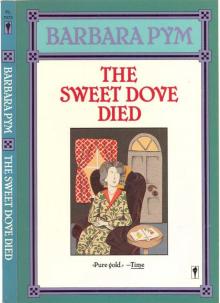 The Sweet Dove Died
The Sweet Dove Died Excellent Women
Excellent Women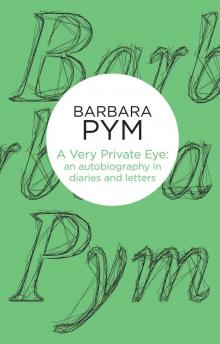 A Very Private Eye: The Diaries, Letters and Notebooks of Barbara Pym
A Very Private Eye: The Diaries, Letters and Notebooks of Barbara Pym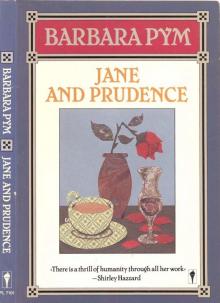 Jane and Prudence
Jane and Prudence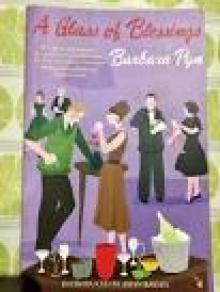 A Glass of Blessings
A Glass of Blessings Civil to Strangers and Other Writings
Civil to Strangers and Other Writings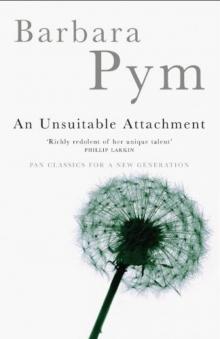 An Unsuitable Attachment
An Unsuitable Attachment Less Than Angels
Less Than Angels A Few Green Leaves
A Few Green Leaves Civil to Strangers
Civil to Strangers